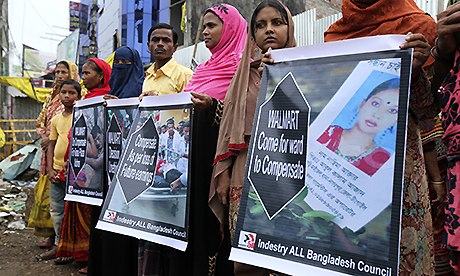H&M pledges living wage for textile workers in Bangladesh and Cambodia
World's second-biggest clothing retailer frustrated by lack of government action in wake of Rana Plaza disaster

Relatives of victims
of the Rana Plaza collapse demand proper compensation and rehabilation
of injured workers. Photograph: Abir Abdullah/EPA
H&M
has pledged to pay a living wage to 850,000 textile workers after
expressing frustration over a lack of action by governments to address
working conditions in Asian factories in the wake of the Rana Plaza
disaster.
The world's second-biggest clothing retailer said it would support factory owners at two factories in Bangladesh and one in Cambodia
to adopt a fair living wage next year. The Swedish company, which has
more than 200 stores in the UK, will then expand the programme to cover
the 750 factories that supply its clothes by 2018.
H&M said:
"We believe that the wage development in production countries, which is
often driven by governments, is taking too long. H&M wants to take
further action and encourage the whole industry to follow."
H&M said that because conditions varied between
countries and factories, it would support textile workers in
negotiating a living wage – a salary that enables a decent standard of
living – instead of imposing a figure. It said paying more to factories
that adopt a living wage would not push up the price of its goods.
The
company said it would use the Fair Wage Method, an established process
for achieving a living wage. After identifying workers' basic needs, a
wage is agreed and is then reviewed regularly with better dialogue
between workers and employers.
H&M said: "We are willing to
pay more so that the supplier can pay higher wages. It is a
collaboration between H&M and our suppliers."
H&M has most
of its clothes made in Asian factories, including Bangladesh, whose
textile industry is vital to the country's economy. National governments
have often been reluctant to stand up to global companies on behalf of
their workers.
Anna McMullen, campaigns co-ordinator
at the Labour Behind the Label campaign group, said H&M's
announcement was encouraging because it meant the company would have to
increase workers' pay. But she called on H&M to be more specific
about its aims.
"It's great for companies to make statements like
this but it remains to be seen what it's really going to achieve unless
they make a commitment to what a living wage really is."
She
called for H&M to put a figure on a living wage, to ring-fence the
costs for payment to factory owners and to follow up on to its pledge to
support negotiations between workers and managers.

























No comments:
Post a Comment